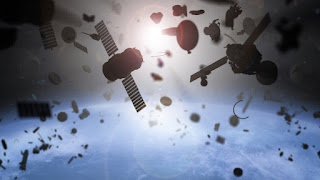Part of the Russian rocket that failed and was stranded in orbit will fall to Earth in the near future. However, it is not clear when and where the object will fall.
Astronomers who have tracked the object's path in space say the rocket portion is likely to hit Earth's atmosphere soon, in a time span of roughly an hour that stretches from 3:27 p.m. ET to 4:21 p.m. ET.
During that time, it will pass through the Indian Ocean, the Southern Ocean, and swaths of the Pacific Ocean. Near the estimated time of final re-entry to Earth, that part of the rocket will be set to fly over Mexico and Texas. But experts say the chances of that part of the rocket hitting the ground are very slim.
"It will probably descend before crossing Mexico and a few miles into Texas," said Jonathan McDowell, an astronomer at the Harvard & Smithsonian Center for Astrophysics, quoted by NBC News.
Like most other space debris that falls back to Earth, the component parts that survive the journey through the planet's atmosphere will likely end up falling on water.
"Most of the world is ocean, so it's just a game of chance," McDowell said.
Although parts of the rocket could soon fall to Earth, it may be hours before the US Space Force and other relevant agencies confirm the time and location of the rocket's return.
The debris is the top of the Russian-made Angara A5 rocket, one of the country's newest fleet of heavy lift launch vehicles. Angara was launched on a December 27 test flight from Russia's Plesetsk Cosmodrome. The unmanned rocket carried a mock satellite.
Shortly after launch, an engine malfunctioned at the top of the Persei rocket, leaving the booster stranded in low-Earth orbit. The part of the rocket, which will fall to Earth, is about 7 meters long and, together with its artificial satellite on board, weighs about 4 tons of material.
Most of the top of the rocket will likely disintegrate as it passes through the atmosphere, but some fragments may make it through intact.
"You might get a few hundred kilograms sticking to the surface. Most of it will melt, but some of the denser parts of the engine will probably survive," he said.
This latest incident again shows the real impact of space debris that must be addressed immediately. Previously, a 10-ton portion of China's Long March 5B booster also fell to Earth in May 2021 and landed in the Indian Ocean.
Administrators of the US space agency NASA have accused China of acting recklessly by allowing fragments of its rocket to fall and risk endangering humans.


